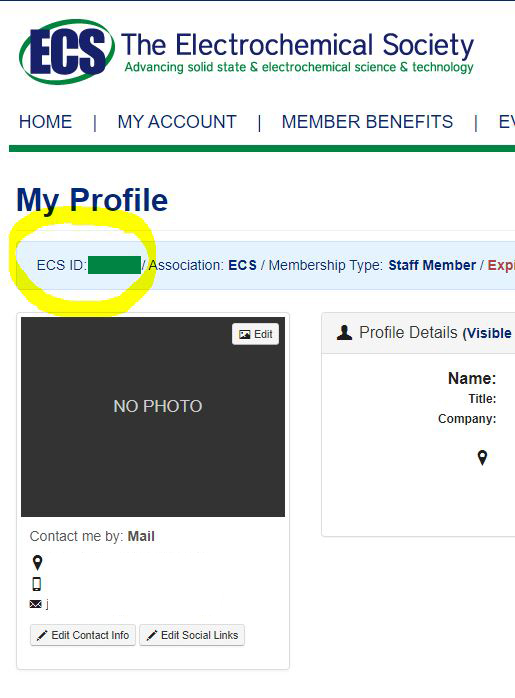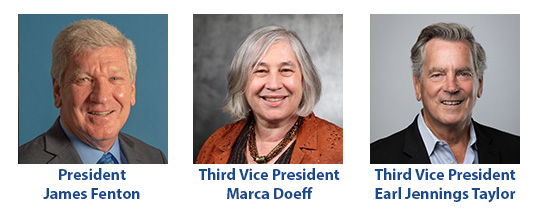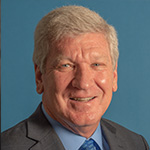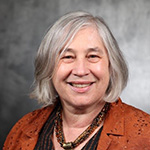It’s time for ECS’s annual officer elections which shape our organization’s leadership for the coming year. We will elect a new President and Third Vice President, each integral to the Society’s continued growth and success.
Voting opens on January 15. We encourage all ECS members to participate in choosing our next leaders. Your vote is essential in determining the Society’s future direction. Best of luck to all the candidates, and thank you to our members for making their voices heard!
Below you can read each candidate’s biography and candidacy statement, followed by voting instructions.
Candidate for President | Candidates for third Vice President
Candidate for President
James Fenton
Biography
James M. Fenton is Professor of Materials Science and Engineering at the University of Central Florida and Director of the Florida Solar Energy Center (FSEC). He leads more than 70 faculty and staff who research, develop, and evaluate clean energy technologies, and prepare the current and future workforce for careers in clean energy. FSEC, which celebrates its 50th year in 2025, focuses on seven program areas: solar energy, high performance buildings, energy storage, decarbonization, transportation electrification, STEM education and workforce training, and energy policy research. Prof. Fenton has more than 40 years of experience in electrochemical engineering and education areas including redox flow batteries, hydrogen, PEM fuel cells, Solar-to-PEM electrolyzer system analysis, fuel processing, high temperature corrosion, oxidizing agent generation, and metal recycling.
An ECS member since attending his first meeting as a student in 1982, Prof. Fenton’s service to the Society includes the offices of Secretary (2017-2021), Vice President (2022-2024), as well as all offices of the ECS Boston Section (now the ECS New England Section) and ECS Industrial Electrolysis and Electrochemical Engineering Division. His committee memberships include the Executive Committee, Board of Directors, Council of Local Sections, Individual Membership, Finance, New Technology, Interdisciplinary Science & Technology Subcommittee, Publication, Education, Ethical Standards, Technical Affairs, and Ways and Means. Prof. Fenton chaired the ECS student poster sessions for four years and chaired the Polymer Electrolyte Fuel Cells Student Poster Session (2011 – 2022).
Prof. Fenton holds a BS in Chemical Engineering from the University of California, Los Angeles (1979), and MS (1982) and PhD (1984) in Chemical Engineering from the University of Illinois, Urbana-Champaign. The author of over 200 publications, he was named Fellow of The Electrochemical Society in 2007 and received the ECS Energy Technology Division Research Award in 2014 for his work on proton exchange membrane fuel cells.
Candidacy Statement
I am honored to be nominated for President of The Electrochemical Society, and, if elected, I look forward to the opportunity to serve our member-driven Society of world-class researchers from industry, academia, and government. ECS has bounced back from the COVID-19 pandemic stronger than ever with increased meeting attendance, reaching more of the world than ever before; increased engagement with our wider community, now offering new membership opportunities; the successful launch of open-access journals, ECS Sensors Plus and ECS Advances; increased communication through social networking sites, videos, webinars, and podcasts; and increased STEM education and outreach opportunities.
It is through these means of engagement that ECS will inspire its future members—graduate and undergraduate students, as well as pre-college students—to choose careers in electrochemical and solid state research. This future workforce will, with our help, develop the technologies that tackle important problems related to energy, health, education, the environment, national security, global development, and climate change. Most of us believe that climate change is a greater global crisis than the COVID-19 pandemic. ECS is uniquely positioned to mitigate climate change. Rapid decarbonization by direct and indirect electrification of energy-producing and manufacturing processes will allow the world to limit the long-term increase in average global temperatures to less than 2oC by 2050, a goal set by the Intergovernmental Panel on Climate Change.
I will encourage divisions and local sections, student chapters and corporate affiliate members to work with regional education systems to provide educational tools for K-12 teachers. Promoting awareness of technical developments in electrochemistry and solid state science will extend the impact of research carried out by ECS members, and support climate change mitigation efforts by the public at large.
As ECS President, my commitment is to collaborate with each of you, the officers, and our outstanding professional staff, to define and implement new visions and new initiatives to enable our members and future members to solve the grand global challenges.
Candidates for 3rd Vice President
Marca Doeff and Earl Jennings Taylor
Marca Doeff
Biography
Marca Doeff is currently an Affiliate with the Energy Storage and Distributed Resources Division (ESDR) at Lawrence Berkeley National Laboratory (LBNL). Prior to her retirement in June 2024, she was Senior Scientist at LBNL and Deputy Division Director of ESDR from 2019-2024. After receiving her BA in Chemistry from Swarthmore College in 1978 and PhD in Inorganic Chemistry from Brown University in 1983, she completed postdoctoral work at the University of California, Santa Barbara and University of California, Berkeley.
Dr. Doeff joined the Naval Ocean Systems Center in 1986 to research antifouling coatings, then in 1990 began research related to electric vehicle batteries at Lawrence Berkeley National Laboratory. Industry, the U.S. Department of Energy, and California Energy Commission were the primary funders of her research, which focused on materials for lithium-ion batteries, sodium-ion batteries, and solid state batteries. She has published approximately 170 peer-reviewed papers and has patented extensively in these areas. A Fellow of The Electrochemical Society and Royal Society of Chemistry, Dr. Doeff received a 2024 ECS San Francisco Section Award, 2024 Lawrence Berkeley National Laboratory Director’s Lifetime Achievement Award, 2023 U.S. Department of Energy Office of Vehicle Technologies Distinguished Achievement Award, and 2020 R&D 100 award. She held various positions on the ECS Battery Division Executive Committee, culminating with Chair from 2019-2020, and volunteered on Society committees including Technical Affairs (2003-2007) and Honors & Awards (2014-2018). From 2020-2024, she served as ECS Secretary.
Candidacy Statement
It is my great honor to run for the position of 3rd Vice President of The Electrochemical Society in 2025. As ECS Secretary from 2020 until June 2024, I saw firsthand the ECS staff’s dedication as they overcame the challenges of the pandemic. We had to quickly pivot to online meetings, and while perhaps not ideal, it allowed us to keep up with electrochemistry during those difficult days. I remember the excitement and relief at the conference in Vancouver in May 2022, when we could finally meet in person again. The vestiges of online meetings are retained to this day in the form of some recorded or live-streamed content, but I think most of us agree that there is nothing that beats meeting our colleagues face-to-face and hearing and giving live talks. We emerged from the pandemic stronger than ever and even increased our membership from the pre-pandemic baseline. During my tenure as Secretary, we also launched a number of initiatives such as the new journals ECS Sensors Plus and ECS Advances, battery workforce development courses, and efforts on sustainability and diversity.
As 3rd Vice President, I would continue to develop and expand these efforts as resources allow. We could, for example, run hands-on training courses for battery workforce education in addition to the online classes we have now, and perhaps include other topics such as hydrogen and fuel cells in conjunction with partners in industry, academic, national lab, and/or other professional societies. We should also consider beefing up our flagship publications to improve impact factors. One way may be to run focus issues on hot topics, inviting authors with relevant expertise to write perspective or review articles. We might consider broadening into topics for these special issues that are not currently part of our technical interest areas but bear relevance to our research, such as policy, techno-economic analysis, and life cycle analysis.
As climate change becomes more evident, governments around the world are seeking ways to mitigate the effects and encouraging clean energy solutions through policy. This is spurring innovation in the form of start-up companies and new initiatives in established industries. The Electrochemical Society is uniquely positioned to address these issues, considering our technical interests in energy storage and conversion, water/energy nexus, semiconductor science, and more. I would like to encourage more industry activity at ECS meetings for the benefit of all. We might consider hosting regular industry days or seminars at our meetings, inviting scientists and engineers from large and small companies to speak on their priorities. I have found that interacting with industry folks has broadened my perspective in my own research and has sometimes led to new collaborative efforts. A heightened industry presence at our meetings would also benefit students and postdocs seeking their next career moves. More active industry engagement and collaboration is one fruitful way to translate fundamental electrochemical science and engineering into action to combat climate change challenges.
It’s an exciting time to be involved with The Electrochemical Society and part of solutions that benefit society as a whole. Please feel free to contact me with your concerns and ideas, and if elected, I will do my best to take action in consultation with members of the ECS Executive Committee and ECS staff.
Earl Jennings Taylor
Biography
Earl Jennings Taylor is Senior Advisor for Faraday Technology, Inc., an electrochemical engineering company he founded in 1991. His vision was to develop novel pulse plating processes devoid of chemical additives and/or hazardous chemicals. This initial vision evolved beyond pulse plating to include pulse electrochemical processes such as surface finishing, electrochemical machining, deburring, polishing, through-mask etching, destruction of pollutants, dewatering, and chemical conversion.
The author of 200+ technical publications/articles and two invited book chapters primarily related to various embodiments of pulse electrolytic processes, Dr. Taylor has 54 issued patents with additional patents pending. He co-authored the first paper describing pulse electrodeposition of nanoscale gas diffusion electrode catalysts for fuel cells (J. Electrochem. Soc., Vol. 139, No. 5, May 1992). ECS recognized his work with the Industrial Electrochemistry and Electrochemical Engineering (IE&EE) New Electrochemical Technology (NET) Award in 2021. The National Association of Surface Finishers (NASF) and European Pulse Plating Symposium also gave him numerous awards related to pulse processes. Dr. Taylor was named Fellow of The Electrochemical Society in 2015 and Fellow of the National Association of Surface Finishers in 2016.
Dr. Taylor completed his MS and PhD in Materials Science at the University of Virginia under Prof. Glenn Stoner, conducting his PhD research in electrochemical kinetics and fuel cells at Brookhaven National Laboratory. He also holds an MA in Technology Strategy and Policy from Boston University and is admitted to the US Patent & Trademark Office bar. Before founding Faraday, Dr. Taylor worked at International Nickel Co., Giner Inc., and Physical Sciences Inc.
After joining ECS in 1978, Dr. Taylor chaired the ECS Boston Section (now known as the ECS New England Section) and various ECS committees including Development and Sponsorship, Interdisciplinary Science and Technology, and Individual Membership. He co-chaired the original board-appointed Free the Science subcommittee addressing making ECS publications more open and accessible. Dr. Taylor served in IE&EE Division officer positions and as ECS Treasurer. He is active in co-organizing symposia including those focused on electrochemical innovation/entrepreneurship and the Bill and Melinda Gates water initiative. Co-author of a recurring series of Interface articles related to patent law, he also presented ECS tutorials on “Intellectual Property for Electrochemical Scientists, Engineers, and Technologists.”
Jennings and Barbara have one son and recently celebrated their 45th wedding anniversary. They enjoy kayaking, pickle ball, walking on the beach, and travelling. Jennings and his son are avid golfers.
Candidacy Statement
When I attended my first ECS meeting as an MS student, I was impressed at the breadth of science and technology discussed. I felt welcomed by well-established and renowned electrochemists and was captivated by the strong sense of community. Since then, I have attended most biannual meetings and am thrilled to see how electrochemical and solid state science and engineering are more relevant than ever. I remain passionate about the impact our science and technology continue to have on critical global challenges and always look forward to attending ECS meetings to learn about new advances and reconnect with colleagues.
Due to its diverse membership and the networking and information sharing facilitated by our meetings and publications, ECS members possess the breadth and depth necessary to conceive innovative solutions for addressing global challenges. In my work experience, I observed firsthand the crucial role that a diverse group of scientists and engineers working within an inclusive culture play in developing creative and innovative solutions to practical problems. Diversity of thought, perspective, and opinion are essential for all organizations including ECS. Moving forward, we must continue to enhance diversity and inclusion, maintain the quality of our meetings, uphold the integrity and impact of our publications, expand opportunities and platforms for information sharing, and continue meaningfully engaging our diverse membership including our younger members who represent the future of ECS.
I am proud of my small role in addressing the challenges of the Free the Science open access initiative. I believe that within every challenge lies an opportunity to shape a new and better future. Open access aligns with our mission to cultivate and disseminate our science and technology to both the electrochemical and broader scientific communities. Since the initial launch of the original Free the Science open access initiative, ECS has implemented and continues to implement organization-wide efficiencies to decrease costs and increase revenues, making us the low-cost producer of high-quality publications.
I am deeply honored to be nominated for the position of 3rd Vice President of ECS and ask for your support. I understand and accept both the stewardship and fiduciary responsibilities associated with being a member of the Executive Board and the Office of 3rd Vice President.
Electronic Voting Instructions
* Please be sure that your ECS membership is current, and your primary division is selected before attempting to log in to the electronic proxy ballot.
Proceed directly to the electronic proxy ballot and follow these easy steps to cast your vote:
1. Enter your ECS member number and password. Your ECS member number is located at ECS My Account. (Highlighted in yellow.)

2. If you have trouble logging into the system, contact customer service.
3. After logging on, your electronic proxy ballot opens. Enter your vote for each office. Space is provided to write in a candidate.
4. You can only vote once.
5. Voting should only take a few minutes.
Vote now! Voting closes at 2359h, March 15, 2025
We have an outstanding slate of officers. Please exercise your membership privileges by voting today! Your input on the leadership of ECS counts.






